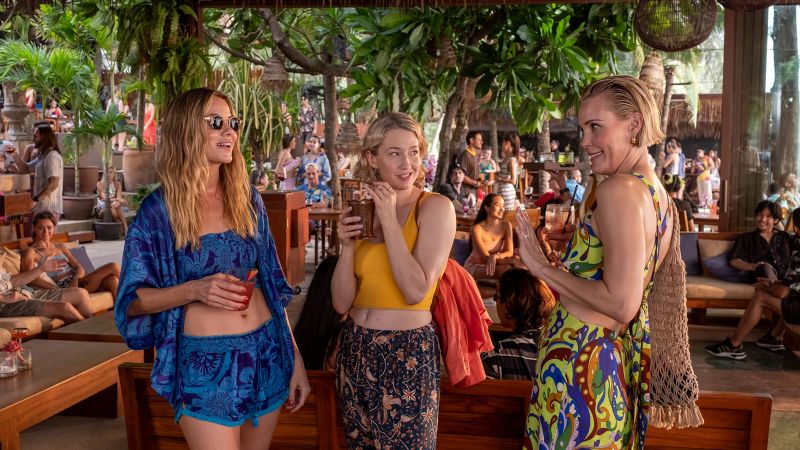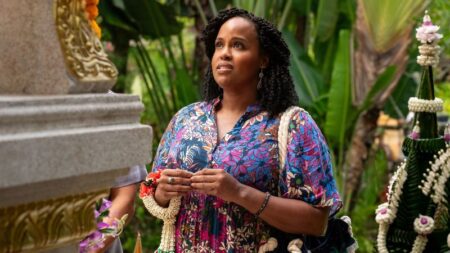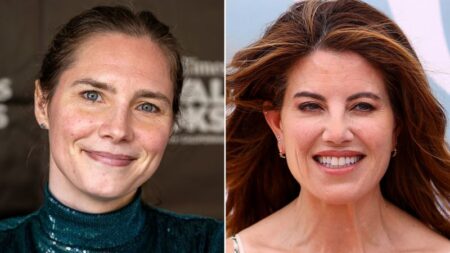The latest season of “The White Lotus” showcases a captivating trio of female best friends who navigate their complex relationships amid humor and drama. As viewers observe these characters exchanging loaded glances while sipping wine and indulging in vibrant fruit, there’s an immediate visual appeal reminiscent of the meticulous layers in a Schichttorte—a classic German cake that demands precise craftsmanship. The writing, much like culinary artistry, reflects a richness that draws people’s attention, compelling them to delve deeper.
To bring these layered characters to life, creator Mike White envisioned the three female leads—portrayed by talented actresses Michelle Monaghan, Carrie Coon, and Leslie Bibb—as a singular entity he humorously dubbed “a big, blonde blob.” This characterization suggests a critique of how women often perceive each other and themselves, wrapped up in societal expectations and the pervasive toxicity of pseudo-positivity. Monaghan explains how their bond is grounded in the shared conditioning women face regarding comparison, judgment, and self-worth, ultimately sparking conversations about life choices and mutual perceptions of success and failure.
Adding depth to the conversation, the host of the show’s podcast succinctly summarizes the characters’ dynamic: they embody a feminized method of disguising unkind impulses behind seemingly benign dialogue. This observation reveals the internal struggles that the three women reflect, raising essential questions to the audience. Are these friendships rooted in genuine affection, or are they merely superficial connections masking underlying resentments? In this whirlpool of emotions, the inquiry deepens—do we love, despise, or even recognize ourselves in them?
Creating a rich narrative, the characters are adept at tricking themselves into believing they share a strong bond. Monaghan’s character, Jaclyn, represents a successful actress who frequently grapples with the hollow recognition that comes with fame. Her seemingly picture-perfect life is juxtaposed against a backdrop of personal sacrifices, including a marriage that rarely coexists with her professional commitments. The reunion with her friends sparks a mix of excitement and apprehension, alluding to hidden layers of anxiety and unspoken tension.
Laurie, played by Carrie Coon, stands as a Brooklyn mother and divorcee, showcasing a precarious balancing act of confidence and insecurity. While her friends sometimes uplift her, there is an underlying sense of competition, particularly concerning her parenting choices and her attempts to guide a troubled daughter in an unforgiving urban environment. Meanwhile, Kate, portrayed by Leslie Bibb, embodies the conservative archetype grappling with her dual identity, navigating the social tension that accompanies differing political beliefs within friendships. Her portrayal solidifies the show’s exploration of how personal backgrounds influence relationships.
Shared histories among the trio reveal varying perceptions of memories as cherished, forgotten, or traumatic. Their daily celebrations, flavored with whispers and subtle judgments, mask the hollowness that permeates their interaction. The friendships, while appearing robust, are riddled with unarticulated fears and criticisms.
This duality engenders conflicting motives in the audience. On one side, viewers may root for the women to face their emotional scars and heal old wounds, peeling back the layers of pretense. Conversely, having experienced the liberating sensation of letting go for self-preservation, one may wish that the characters escape the toxic cycle, searching for more fulfilling, authentic connections elsewhere.
Within just the initial episodes of Season 3, these characters and their intricate relationships offer more to unpack, promising to hold viewers’ attention with curiosity and intrigue. Given the history of “The White Lotus,” audiences can anticipate that the revelation will be thrilling, possibly unraveling deeper societal issues and personal dilemmas.
Currently, “The White Lotus” Season 3 airs on HBO and is also available for streaming on Max, an extension of HBO in association with Warner Bros. Discovery, engaging viewers in this evocative narrative captivated by human behavior and intricacies of friendship. The show’s ability to address complex themes through a lens of dark humor makes it a notable addition to the discussion around contemporary relationships and societal expectations.











